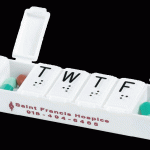 This blog post has been featured on the healthcare social media blog Health2Social and has been re-posted here.
This blog post has been featured on the healthcare social media blog Health2Social and has been re-posted here.
A recent WSJ Health Blog post titled “Unraveling Why Patients Don’t Take Their Meds?” argues that one reason patients stop taking their medications is the negative side effects they may experience. The post mentions some astonishing reasons for the lack of drug compliance. The blog mentioned that a recent study by the New England Healthcare Institute (NEHI), which brought together experts on patient medication adherence found that “there are many reasons besides side effects that patients don’t take their medicine: cost, the challenge of managing multiple prescriptions, cultural issues, forgetfulness and a reduced sense of urgency if they don’t feel any symptoms.” The article also mentioned that “an estimated one half to one-third of Americans don’t take their medications as prescribed by their doctors . . . contributing to about $290 billion a year in avoidable medical spending including excess hospitalizations.”
I find this quite amazing to believe. I agree that negative side effects may be the main reason patients stop their medications, but this, and the other reasons listed seem to be only dwarfed by the bigger issue. As I had mentioned in a previous post: Working as a spy for a secret agency; Decoding Healthcare’s Elusive Prescription Dilemma, trying to read your prescription and figure out what one is taking, what dosage, and why, is like trying to decode a secret message between the doctor and pharmacist.
Yes, all the reasons motioned above are true, but most of them can be solved by better patient education, more time spent with the patient encouraging Q&A, and a clearer prescription system that is inclusive of the patient, rather than secretive and exclusive. Only by educating patients and encouraging their questions, can doctors provide their patients with the tools to take control of their own health. As Thomas Goetz, executive editor of Wired Magazine, and author of The Decision Tree, points out over and over in his book, being in control of your health actually increases your health (as seen from the British Whitehall Study from 1967). If physicians empowered their patients by education and clear communication, patients would feel more control over their health, thereby leading to better health outcomes.
The WSJ post does mention that “simplified drug regimens, better patient education and closer monitoring of patients on medication by case managers” are part of the proposed solutions. I think these are great proposals, and a better use of those $290 billion wasted should go to compensating primary care providers to spend more time education the patient, including them in the prescribing process, and following up with their patients on drug regiments.
Another solution is to create a more social aspect of medication compliance. As noted from the wildly successful Weight Watchers program, mainly as a result of the social network aspect (support groups, similar to AA meetings). We at Health2Social would like to see more socially engaged programs related to medication adherence. If patients agree to sign off on a medical release, physicians can connect them with others who have the same diagnosis and are on similar medications. You then can create everything from a buddy system to actual support groups (moderated by a healthcare provider) to enhance the overall engagements in one’s health, and increase adherence.
